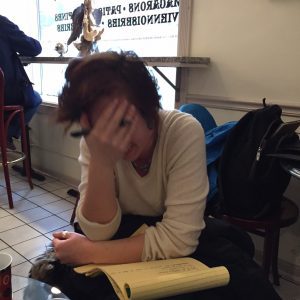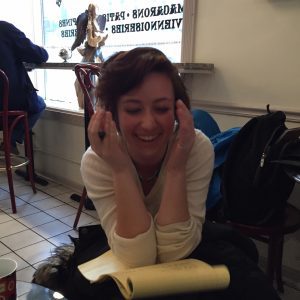Selina Fillinger
Playwright, Faceless
Even after I began regularly following the news I continued to avoid the world politics section. I used to skim the headlines to get a vague sense of what was going on, but after seeing a photograph of a toddler whose scalp had been sliced by a machete, I stopped looking at that section of the newspaper altogether. US politics upset me, too, but in a motivational, productive kind of way. Global politics only ever motivated me to crawl back into bed. Every headline sad, every headline the same: soldiers fighting, children dying. Deals may be negotiated, dictatorships may fall, but I have never reached for The New York Times with the thought, “I wonder if there is peace today.”
I’m being reductive. Things are actually changing at lightning speed all over the place. It’s a testament to my privilege and ignorance that I can speak in platitudes about such things. However, this was my justification for avoiding world politics for 21 years. After all, these conflicts have endured for centuries, and my white, American, collegiate dismay over the situation wasn’t going to change that. Right?
For my first three years of college, the majority of my knowledge about the Middle East came from Jon Stewart’s The Daily Show, which I watched at my desk during slow days at work. However, in the spring of my junior year at Northwestern University, I stumbled across an article about ISIS and was sucked into the story before I realized the subject matter. The piece was little more than a brief in a Colorado newspaper: A white, 19-year-old American girl was on trial for attempting to join ISIS. The FBI had been following her online communication with terrorists for several months and notified her parents. When her father found her boarding pass he reported her to the FBI and the girl was arrested on the airport tarmac.
The story was short and read like fiction. I couldn’t believe someone raised in America would be crazy enough to abandon everything and join a terrorist group, let alone one that openly abuses women. I Googled the girl. My search yielded plenty of results, but only the top two hits had anything to do with that particular case. The rest were articles, op-eds, and blogs about other adolescents—western, white teenagers—who had been lured from their homes and coerced to join the ISIS cause.
I scrolled through the pages in disbelief.
They’re crazy. ISIS is crazy. So anyone who joins ISIS must be crazy.
I clicked on a government issued report: as of 2015 over 250 American citizens had tried to join ISIS.
No. That can’t be right.
I found another census. Hard to say, the article conceded, since not all parents report their children missing. But roughly 250.
Teenagers. Kids. Kids born into democracy. Educated. Middle class. 250 of them.
They can’t all be crazy.
Their parents can’t all be neglectful or abusive or naive.
There has to be something these kids are not finding, something they’re searching for that we are not providing them. That was the only explanation I could come up with for such sudden radicalization: Needs unmet, voices unheard. People desperate for recognition, community, purpose.
I bookmarked the article.
I turned to the world politics section of The New York Times.
I began to read.
My playwriting teacher, Laura Schellhardt, approached me at the end of my junior year and offered me Northwestern’s Next Step Working Commission. Each year Laura partners one or two senior playwriting students with a local artistic director, who mentors them through a year-long new work development process. The idea is to give students the experience of being commissioned by and writing for a professional theatre. At the beginning of the year the student pitches play ideas to her mentoring director, then spends a year developing the selected play. In the spring, the play receives a staged reading with a professional director, up to two professional actors, and as many Northwestern actors as needed. It was a dream come true to be selected for the Working Commission, and when she told me she would be partnering me with the Artistic Director of Northlight, I couldn’t believe my luck.
I pitched BJ two ideas: (1) a wacky farce about undergraduate research assistants trying to save the world’s honeybees, and (2) a legal drama about a girl who tried to join ISIS. I waited for his response, trying not to get too attached to my “Terror Play.” It didn’t work. I scribbled dialogue in the margins of my notebooks and compulsively bookmarked ISIS articles.
I have to write this one. Right now, it has to be this one.
Fortunately, BJ felt the same.
The only thing that scared me more than taking on such controversial subject matter was knowing that a professional artistic director would be reading my work. I spent fall quarter researching ISIS, Islam, and the American judicial process. Finals passed, winter break arrived, and I boarded a plane to return home to Oregon for the holidays. My first draft was due in a week and I was looking forward to utilizing the four hours in the air to work on the play. As soon as we took off, I opened my computer and the two passengers next to me stiffened: I had three articles of Al-Qaeda and a pdf of the Qur’an open on my screen. “It’s for school,” I said. They nodded and turned away. I dimmed my desktop, wondering how that exchange would have gone if I were a person of color.
I arrived in Oregon, sent BJ the first draft, and didn’t hear anything from him for two weeks. By the second week I was convinced he hated it. Finally, my first week back at school, I was doing homework in the NU library when I received a call from a number I didn’t know.
“Hi, it’s Beej.”
Oh god.
“I read the draft. I was impressed.”
Thank god. Oh thank you thank you thank you—
“Let’s get together to talk.”
He wants to talk about it! He thinks my play is worthy of discussion! My career lives to see another day!
We met the next week at a coffee shop. I was surprised that Lauren Shouse, the theatre’s literary manager was there. BJ, Laura, Lauren and I squeezed around a little table. I took out a legal pad and pen, ready to take down any feedback I received. BJ turned to me:
“We want to put your play in Northlight’s mainstage season next year.”
I believe my exact words were, “Like…What?”
“A production. We want to produce your play.”
I continued to stare at him blankly.
“A professional, full production of your play, Selina. And I will direct it.”

 Somewhere on Laura’s phone there are pictures of me receiving this information: beet red, trying not to cry, clutching my coat to my chest like a security blanket. I have little memory of the rest of the meeting. At one point the waitress offered me more coffee, and when my only response was incoherent sputtering, BJ answered for me, “I think she’s buzzing enough already.”
Somewhere on Laura’s phone there are pictures of me receiving this information: beet red, trying not to cry, clutching my coat to my chest like a security blanket. I have little memory of the rest of the meeting. At one point the waitress offered me more coffee, and when my only response was incoherent sputtering, BJ answered for me, “I think she’s buzzing enough already.”
Eight months later, I’m still buzzing. This process has changed my life in more ways than I could have anticipated. It has jumpstarted my career, brought me into contact/collaboration with extraordinary theatre-makers, and empowered me to take ownership of myself as a professional artist. The play itself has stretched me beyond what I thought was possible—artistically, as well as personally. Although the subject matter is far beyond my scope of experience, Faceless continues to feel more revealing and personal than anything I’ve ever written. Yes, the play deals with terrorism and religion and justice and media and prejudice. If audience members leave discussing any one of those topics, I will be satisfied.
But for me, all of that is extra.
For me, this play is first and foremost about two young women trying to face their fears, find their voices, and leave their marks.
At this point in my life—my first year out of college, my first professional production—I can’t imagine a more personal story to tell.

